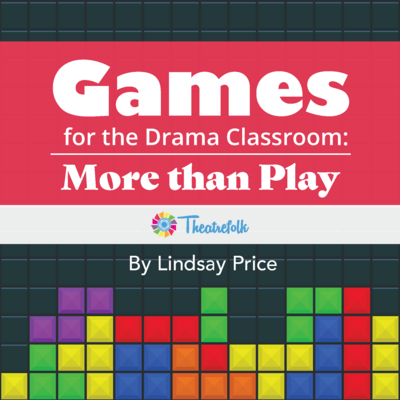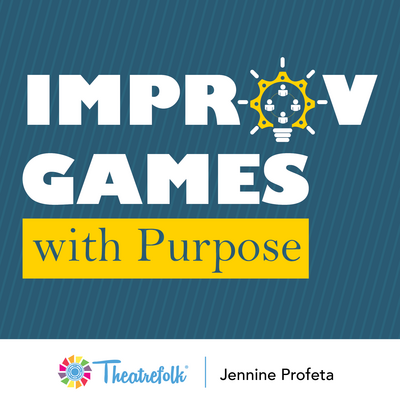Smiles, hugs and hi-fives. Isn’t that all it takes for a middle school student to be happy? The Happiness Shop is an excellent class project that explores important issues.

Taking Away the Script: A Game
It’s easy for students to get hyper-focused on their lines when they’re working on a scene or on a show – counting how many lines they have, memorizing the lines, knowing what order the lines come in a scene, understanding what the lines mean. However, lines are not the be-all and end-all of theatre. There are so many ways to communicate a story without words.
Try the following game with your students to work on exploring dramatic storytelling without using words. It’s inspired by the episode “Hush” from the fourth season of the TV series Buffy the Vampire Slayer. In the episode, the heroes have their voices stolen by a group of villains called the Gentlemen, and they are challenged to communicate with each other silently to figure out what happened and how to defeat the bad guys. They come up with a variety of useful and funny ways of communicating, to varying levels of success. The inspiration for the silent episode stemmed from critical praise for the show, stating that the dialogue was the most successful aspect of the show. In response, the series creator of Buffy, Joss Whedon, decided to write an episode almost entirely devoid of speech.
For this game, students will work in pairs or small groups. Teachers, you will need to provide your students with a short scene (approximately 1-2 minutes in length). All the groups will work on the same scene. You can find some great two-person scenes and group scenes here or you may select or write your own scene.
Read through the script with the full class and answer any questions that students may have about the content. Then students will re-read through the script in their groups, decide who will play what role, and start to prepare the scene to present to the rest of the class. (Memorization isn’t necessary – students will prepare their scene to be presented on-book until the twist is revealed.)
Partway through the “rehearsal process,” share the game’s twist – all of a sudden, everyone’s voices have disappeared. Groups can’t use words to perform their scenes. How will they still be able to communicate what’s going on in the scene? What are the most important plot points and details that need to be conveyed?
This is where each group is challenged to come up with a creative way to communicate the story without using their voices. Students might try using silent theatrical techniques such as mime, tableaux, facial expressions, body language, different kinds of alternative visual communication (such as pointing to words, using whiteboards, and so on), playing a charades-style game, puppetry, creating a dance, or coming up with another way of communicating the story visually. Sounds and noises from their mouths can’t be used, but other methods of creating sound (such as using instruments or music from their phones) are acceptable. Presentations should be approximately the same length of time as the scene would have taken to present as written – about one to two minutes in length.
What makes this game fun is that, even though each group is presenting the same scene, each group’s interpretation of the scene will be different, depending on what technique they use to present the scene and what plot points and details they deemed most vital to the story. Encourage students to push themselves to make big and clear physical choices.
Each group will present their interpretation of the scene. After each scene (if time permits), allow students to share the thought processes behind their presentations. Students will complete the game by completing and submitting an individual Reflection.
Distance Learning Adaptation Exercise (minimum 2 classes + homework)
1. Discussion: How can actors perform on a digital platform without using words? Here are some ideas to get their brains going:
- What is different from performing in person to performing online?
- What limitations occur when performing online? How might they be overcome?
- What advantages are there to performing online versus performing in person?
- What household items could be used to facilitate a nonverbal performance?
- What alternate methods of performance or storytelling could be used for online performances?
2. Assignment:
- Divide students into groups.
- Distribute scripts to the group members.
- Assign each group their own digital breakout room.
- Students will have the remainder of the class time to read the script and figure out a way to tell a one-minute long version of the story of their scene online, without using words.
- Groups will need to decide if they will perform their pieces live, or record their piece and submit it.
- Groups will need to meet outside of class time to either rehearse their live presentation or record their pieces OR assign an additional class period for rehearsal/recording.
- At the next class, students will present their live or recorded pieces.
- If time permits, allow students to share the thought processes behind their presentations.
- Students will complete and submit an individual reflection.
Related Articles
Create Your Own Choice Board: Drama Activities
by Lindsay Price
Choice boards give students the opportunity to choose how they want to learn a particular subject. Create Your Own Choice Boards: Drama Activities can help encourage your students' independence by allowing them to take an active role in their learning.
Distance Learning
by Christian Kiley
A play about trying to survive and thrive in a virtual classroom.
Games for the Drama Classroom: More Than Play
by Lindsay Price
A collection of games and activities that go well beyond the notion of "play."
Improv Games with Purpose
by Jennine Profeta
Improv games including feedback suggestions and questions, game variations, teaching tips, side coaching tips, entry prompts, exit slip questions, and more!






